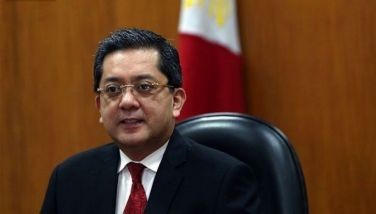Marawi rehabilitation: A patchwork of sketchy plans, loose rules, uncertain funding
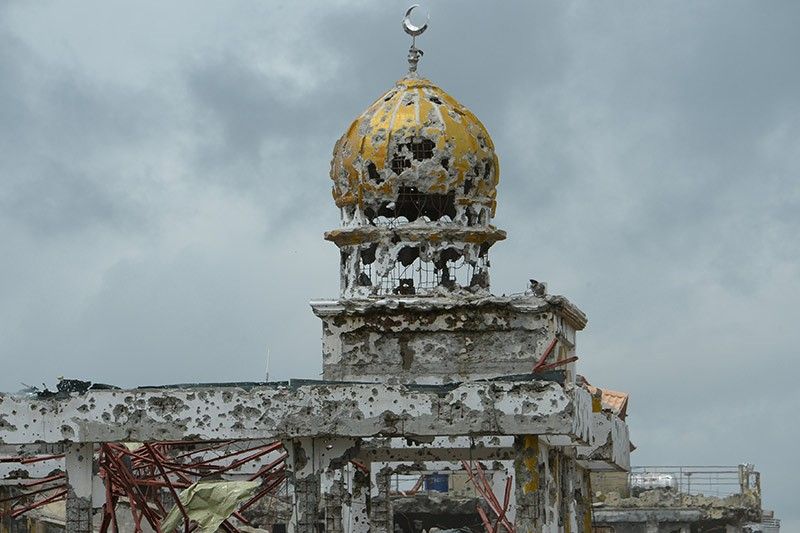
Philippine Center for Investigative Journalism — The siege of the Islamic City of Marawi marks its first anniversary on May 23 but its vaunted multi-billion peso rehabilitation and reconstruction program remains a patchwork of disconnected promises mired in multiple problems.
The government has pledged to roll out a total of 892 programs, activities, and projects for Marawi under an ambitious “master plan.” The target completion date for the mammoth venture is by 2022, or before President Rodrigo Duterte bows out of office.
But this master plan has not been finalized and remains framed in loose procurement rules and legal shortcuts—and with a constantly rising financing cost with still uncertain funding.
Not the least of the venture's problems are loopholes in the guidelines on the awarding of project contracts, on-off and token consultation with the affected communities, disjointed work by national and local state agencies, unsettled land rights and reparations claims, and some contractors with little or no creditable track record in civil works, and instead are tied to a string of bad projects, and fraud and corruption cases.
The fighting in Marawi, a city of about 250,000 in the Autonomous Region in Muslim Mindanao (ARMM) and the capital of Lanao del Sur, resulted in more than 1,100 fatalities, including at least 47 civilians.
Other areas of Iligan City and Lanao del Sur were also affected, resulting in the displacement of as much as 350,000 people, many with their homes damaged or totally destroyed.
The siege had rendered at least 24 of Marawi’s 96 barangays within what is now called the “most affected area” or the MAA uninhabitable and wiped out the city's commercial and business center.
Also referred to as ground zero, Marawi’s MAA, reduced to rubble by the five-month battle between soldiers and extremist Maute rebels last year, would soon see a virtual paradise rise on it by 2021—or so the Duterte administration has promised.
A selection committee has yet to announce which company will undertake the project.
But Task Force Bangon Marawi (TFBM) Chairman and Housing Secretary Eduardo del Rosario told PCIJ that the Bagong Marawi Consortium (BMC) has been pre-selected over five other proponents, including a Malaysian entity, "based on merit, project cost, terms of payment, quality, and financial capacity."
But until Monday this week, the committee's secretariat head, Falconi Millar, secretary general of the Housing and Urban Development Coordinating Council (HUDCC), told PCIJ that the BMC had yet to submit the most basic required documents, notably its consortium agreement, technical and financial proposals, detailed computation of costs, and proof of registration of its member entities with government regulatory agencies.
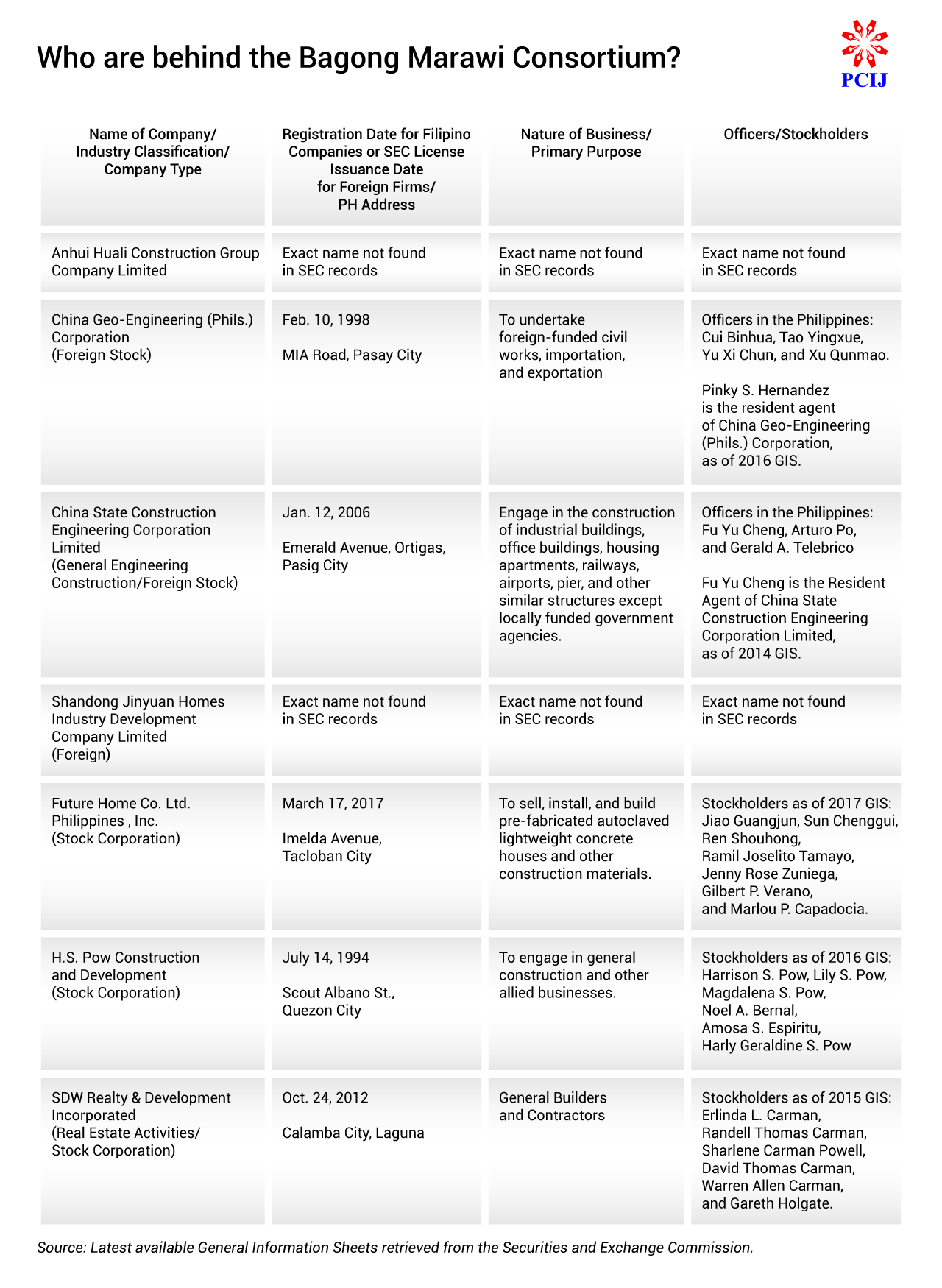
Documents not all in
On Feb. 5, 2018, President Rodrigo R. Duterte issued Executive Order No. 49-2018 authorizing del Rosario as TFBM chair and the National Housing Authority (NHA) to select government's private sector partner via joint-venture agreement to implement the civil-works projects in Marawi's MAA.
Three months hence, TFBM and its selection committee started "negotiations" with BMC, a process that del Rosario last week said would take only seven to 10 days. More days had lapsed but the negotiations are not done yet because of BMC's failure to submit all its documents.
And yet, as early as December 2017, or while the dust stirred up by the conflict had barely settled, BMC—made up of five Chinese and three Filipino companies—had submitted an unsolicited proposal to build that government’s promised paradise on the 250-hectare MAA that covers more than a quarter of Marawi’s 96 barangays.
BMC’s initial proposed cost for the project: P17.2 billion.
Del Rosario paints a fulsome picture of BMC. But this has doubtful basis in fact, on both its Chinese and Filipino sides.
Indeed, in contrast to del Rosario's rosy read of BMC's potentials, PCIJ's research shows that BMC consists of companies with little to no experience in public contracting in the Philippines, and a lead Chinese entity with a checkered history of being blacklisted, investigated, and sued for collusive bidding, fraud, bad projects, tax evasion, and political lobbying in the country and overseas.
TFBM itself has yet to disclose copies of BMC's proposal and submissions. A crucial question that the Task Force has also left unanswered, or has apparently not asked the prospective contractor, is what BMC's revenue model or plan is for recouping the billions of pesos it will pour into Marawi.
75-25 equity split?
HUDCC's Millar last Monday clarified that the government's selection committee will require a 75-percent Filipino vis 25-percent foreign equity sharing in whatever consortium will be chosen for the MAA project.
This is not an explicit requirement in the Task Force's guidelines but, Millar said, it is required in procurement laws. The three Filipino firms of BMC have assets and retained earnings that, even combined, are far puny figures compared with that of the five Chinese companies.
Should BMC's Filipino and Chinese firms fail to meet this equity spread, Millar said that the Task Force has no choice: "We are back to zero, we have to repeat the selection process."
And should a joint-venture agreement fail to meet the requirements of the MAA project, Millar said, the Task Force may opt for "other arrangements, other modes of procurement." He did not, however, elaborate what these would be.
Then again, to this day, del Rosario's task force has also not produced the final version of government's master plan for Marawi, or its the Bangon Marawi Comprehensive Rehabilitation and Recovery Plan (BM-CRRP).
The latest version of the plan that the public has seen is dated March 23, 2018. PCIJ requested a copy of the final master plan but del Rosario last week said that it was not done yet.
At a press briefing on Monday, the National Economic and Development Authority (NEDA) gave the public a peek into the May 15, 2018 version of the master plan, but only through a powerpoint presentation.
By the text of the Task Force's guidelines, the "scope of work" in ground zero that the contractor must manage is not exactly little or light. At the same time, though, the scope of work hardly offers clear big potentials for the contractor to raise revenues.
Attached to the guidelines issued by NHA is the 16-point "minimum scope of work" that the MAA contractor should undertake—but which "may be further amended by the NHA."
It covers debris management; site development plan; concrete road infrastructures (per lane, per kilometer, including street and traffic lights) with provision for bike and pedestrian lanes; provision for underground utilities such as water, power, and telecommunications; parks and recreational sites on both sides of the Agus River and Lake Lanao waterfront on the Marawi side; vertical development based on classifications provided for by the National Building Code; and a centralized Waste Water Treatment Facility or Centralized Sewage Treatment Plant for a population of 60,000, and with the discharge meeting standards of the Environment department.
In addition, the NHA guidelines said, the MAA contractor must build 24 units of two-storey barangay complexes, each on a 1,000-square-meter lot (with health center, multi-purpose hall, and a 100-square meter, two-classroom Madrasah); 22 two-storey elementary and high school buildings with 20 classrooms each; a Meetings, Incentives, Conferences and Events (MICE) Convention Hall with a 5,000-seat capacity to be located in the areas fronting the lake; a two-hectare Memorial Site with a museum located in the areas fronting the lake; preservation of at least three historical/heritage sites (Bato Mosque and two other sites); port facilities; a multi-modal transport hub; and a two-storey Grand Padian or central market with 5,000-square-meter floor area per floor or a total floor area of 10,000 square meters on a two-hectare lot.
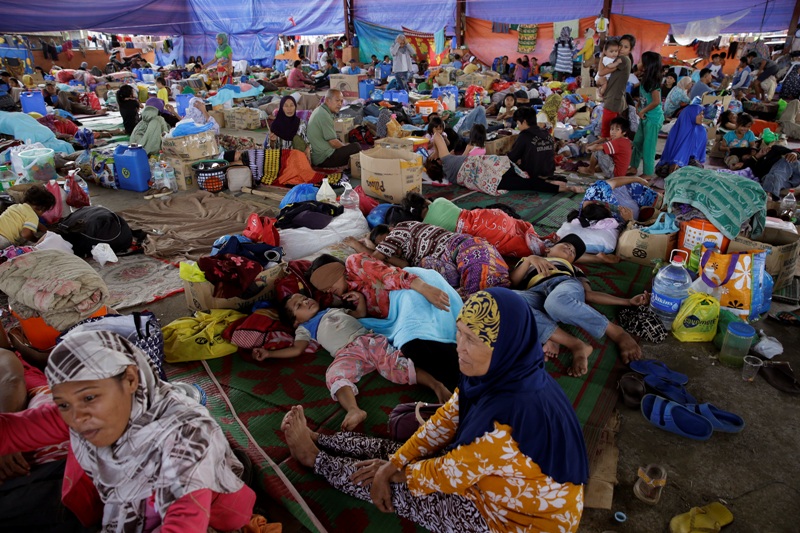
China State 'the face'
Of the eight BMC companies, China State Construction Engineering Corp., reportedly one of the largest international contractors in the world, is the only firm that had previously been awarded with government contracts in the Philippines.
Data from the Department of Public Works and Highways (DPWH) show that in 2007, China State was awarded with a contract package worth P486.34 million.
Del Rosario in fact believes that it was China State’s supposed reputation as a major international contractor that helped convince the technical working group to choose BMC over five other firms that submitted proposals for the Marawi project: China Railway Corp., China Harbour Engineering Company, Power China, Alloy MTD, and a consortium led by the Malaysia-based Granby Construction Sdn Bhd.
According to del Rosario, the technical working group used five criteria to evaluate the proposals: financial capacity, project cost, terms of payment, timeline, and conceptual design.
Except for the Granby-led group, whose proposal was not considered because its offer covered only housing development, all the other proponents were found to be capable of carrying out the project.
But del Rosario said that BMC may have ended up being chosen largely because of China State’s “number one status in China”—presumably as a contractor, since the state-owned China Daily says that in 2017, China State Construction Engineering Corporation Ltd. ranked only fifth among China’s public enterprises, based on their operating revenues in 2016.
Del Rosario also described China State as the “face” of the consortium.
He added, “Whoever is part of the group, it will be subsumed by the biggest developer that will be the face of the group. That’s what I think became the basis of their assessment that all the companies (in BMC) are financially capable and that experience-wise, each one in it is able to undertake similar projects.”
In truth, China State and China Geo Engineering Corp., the mother company of another consortium member, China Geo Engineering (Philippines) Corp., are state-owned enterprises or SOEs of China.
The inclusion of the two firms in BMC thus raises a question of what role and state funds the government of China itself is putting up for the projects, and whether or not they should be considered private or state entities.
Del Rosario told PCIJ that in his view, the two firms are joining the BMC as private contractors and that no official development assistance or loans from China would bankroll Marawi's ground-zero projects.
That is not the only possible problem with the two Chinese state firms, though. For one, both were included in the World Bank’s corruption and fraud blacklist in 2009.
The World Bank in 2009 debarred China State Construction Engineering Corp. Ltd. along with China Geo Engineering Corp. and five other firms for “engaging in collusive practices” during the bidding of a Philippine road project funded by the multilateral agency.
String of scandals
Investigation by the World Bank’s corruption-fighting unit, Integrity Vice Presidency (INT), revealed that the contractors were involved in a “major cartel” when they submitted bids for the first phase of the National Roads Improvement and Management Program, also known as NRIMP 1.
On July 11, 2005, China State Engineering Construction had also been blacklisted for a year—later reduced to six months on the company's appeal—by the DPWH for violating of Section 69.1.9 of the implementing rules and regulation of Republic Act No. 9184.
Before the IRR of R.A. No. 9184 was revised in 2016, Section 69.1.9 pertains to committing an act/s that tend to defeat the purpose of the competitive bidding, such as “an eligible contractor not buying bid documents, and contractors habitually withdrawing from bidding or submitting letters of non-participation for at least three times within a year, except for valid reasons.”
On Aug. 11, 2010, then Internal Revenue Commissioner Kim Jacinto-Henares filed before the Department of Justice a tax evasion case against China State Philippines Engineering Corp. for failure to pay about P172 million in taxes, inclusive of penalties and civil liability, from 2003 to 2006.
The firm's owners reportedly falsified tax certificates and certificates of final tax withheld belonging to its mother company, China State Engineering Construction Cop. Ltd.
On June 17, 2016, however, the Court of Tax Appeals ruled that the company was not liable for the deficiency taxes and penalties.
The court said that the assessments made by the revenue agency for 2003, 2004, and 2005 were issued without valid authority, while the assessment for 2006 was void "for being issued when the respondent's right to assess the petitioner (China State) has already prescribed."
To be sure, the World Bank’s current list of Debarred Firms and Individuals, no longer has China State and China Geo Engineering on it.
The list includes names of companies and persons ineligible to be awarded a World Bank-financed contract for certain periods because they have been sanctioned under the Bank's fraud and corruption policy.
Elsewhere in the world, however, China State Engineering Construction Corp. is still getting into one scandal after another.
Just this April in Namibia, two top executives of the Namibia Airports Co. were forced to resign after they were charged with bribery, fraud, corruption, forgery and dishonesty, for awarding the contract for Phase 2 of the Ondangwa Airport to China State, without bidding or legal tender.
The project cost had jumped from Namibian $169 million to N$211 million (about US$13.5 million to US$16.5 million) according to the information filed with Namibia's high court. Phase 1 of the airport project worth N$208 million (US$16.6 million) had earlier been awarded to China State as well.
Earlier, in December in the Bahamas, the original owner of the Baha Mar resort there filed a $2.25-billion lawsuit against China State for alleged "massive fraud" in the construction of the luxury hotel and casino project that opened only last April, after years of delay, according to media reports.
The complaint accused China Construction America, a subsidiary of China State, "of running a self-enrichment scheme that led to the failure of the $3.5-billion mega-resort project in 2005."
Conceived to be the largest-ever Caribbean resort, the project faced a series of construction delays and funding squabbles, including over "hundreds of millions of dollars in sham bills" that the Chinese firm submitted.
In Pakistan last February, a committee of the parliament also demanded details of the government's grant of 11 billion rupees (about US$95 million) in tax exemption to China State, which is constructing the Karachi Peshawar Motorway, according to reports in Asianet-Pakistan.
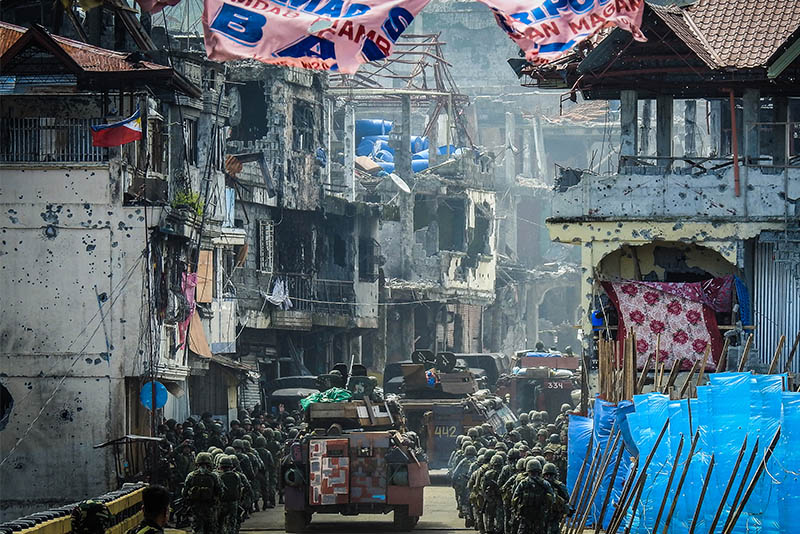
No PH subsidiaries?
Data from the Philippine Government Electronic Procurement System (PhilGEPS), meanwhile, show that China Geo Engineering Corp.’s local subsidiary China Geo-Engineering (Philippines) Corp., got two big projects from the DPWH in 2014 and 2015 worth a total of P3.18 billion.
The other three Chinese companies included in BMC are Anhui Huali Construction Group Co. Ltd., TBEA Co., Ltd., and Shandong Jinyuan Homes Industry Development Co. Ltd.
The same exact names of these Chinese firms were not found in the online repository of the Securities and Exchange Commission (SEC). This is presumably because they are foreign companies and/or have not established subsidiaries in the Philippines.
China Geo and China State, for their part, registered with the SEC on Feb. 10, 1998 and Jan. 12, 2006, respectively.
Rico Gonzalez, identified by two Filipino companies in BMC as the consortium’s spokesperson, said that the blacklisting of China State and China Geo became an issue when they were still forming their group, but that they were informed as well that the two firms were no longer on the World Bank’s list of debarred companies.
He said that the consortium has “an agreement” and a Filipino management group that will ensure that the undertaking will result in quality projects.
That management group is apparently Winsam Management Group Inc., a stock corporation that registered with the SEC in March 2017 and which holds office in San Juan, Metro Manila.
In an email to PCIJ, Ramil Joselito Tamayo, president of Future Home Philippines Inc., a Filipino entity in BMC, referred to Winsam as being “headed” by Gonzalez.
Millar of HUDCC said of Winsam: "I heard about it from one of the discussions, it is said to be the overseer, in charge of monitoring, supervision of the BMC proposal."
Who speaks for BMC?
TFBM’s del Rosario also acknowledged Gonzalez as one of BMC’s perennial representatives at meetings with the task force. Del Rosario said that the other representative is a “babaeng matanda (elderly lady), parang (looks) Chinese.”
He could not recall the lady’s name at the time of the interview but he said that she seemed to be the consortium’s “leader.”
On Monday, HUDCC's Millar told PCIJ that Gonzalez has stopped attending meetings of the Task Force on BMC's proposal. It is now a certain Harry Cuevas from North Cotabato—identified in a few press reports as an engineer—who speaks for BMC.
Millar said that he has also seen the elderly lady supposedly from BMC, but could not recall her name as well. Nevertheless, he said, "whoever it is BMC sends to attend the meetings, we receive them."
Last October, Cuevas, Millar, and del Rosario escorted engineer Lee Wang from one of the Chinese companies of BMC and five technical specialists to survey Marawi's ground zero.
A two-line remark from Cuevas, who is now being referred to as the consortium's manager by those involved in the negotiations, surfaced in news reports. “We want to make sure the Maranao are not outsiders in the plan,” Cuevas was quoted as saying by local media.
“This is their city and they have a say on the master plan for Marawi."
Before he suddenly disappeared from the picture, Gonzalez himself had told PCIJ that he is part of a third-party management group that in the beginning helped organize the consortium. His firm, he said, also acts as consultant for the consortium members, from which they are paid for their services.
These include, Gonzalez said, taking care of documentation especially for the foreign firms.
According to Gonzalez, the consortium originally had 13 members but later ended up with nine. The final count resulted in eight when publicly listed A. Brown Company withdrew from the consortium in the course of submitting the proposal for the Marawi project.
Aside from Future Home, the Filipino firms included in BMC are H.S. Pow Construction and Development, and SDW Realty & Development, Inc.
(TFBM head del Rosario, however, told PCIJ that he has yet to receive formal notice of A. Brown’s withdrawal from the consortium. Until the Task Force gets one, he said, it deems A. Brown to be still a part of BMC.)
Interviewed by PCIJ twice via phone, Gonzalez was responsive to PCIJ in late April but turned reticent by May 10. That was when PCIJ further asked about the management group and track record of BMC's member-firms.
In the later phone conversation with PCIJ, Gonzalez said that he could not answer further queries from the Center until after the project has been officially awarded to BMC. Gonzalez had even agreed to, but later canceled, a sit-down interview with PCIJ.
The consortium, according to Gonzalez, was still negotiating with the government while also having internal negotiations among its member firms. He said that the consortium would call for a press conference as soon as it is chosen as the joint-venture partner for the project.
Small Filipino firms
H. S. Pow and SDW Realty registered with the SEC years ago, and have licenses issued by the Philippine Contractors Accreditation Board (PCAB). The third, Future Home, registered with the SEC only in March 2017 and has no PCAB license as yet.
H.S. Pow and SDW Realty are actually the only firms in BMC with PCAB licenses, but these are due to expire on June 30, 2018. They also do not have valid PCAB registration for government projects.
And while both H.S. Pow and SDW Realty are registered with the Philippine Government Electronic Procurement System or PhilGEPS, a mandatory requirement on government suppliers, they have “red memberships,” which means they can participate only in procurement modes that require just a PhilGEPS registration number, such as direct contracting and highly technical consultation.
Procurement modes that require a certificate of PhilGEPS registration from participants—public bidding, limited-source bidding, and negotiated procurement—would need a platinum PhilGEPS membership from interested parties.
Incidentally, SDW Realty became a “red” member only last May 6. Future Home is not registered with PhilGEPS at all as of this writing.
Not surprisingly, PCIJ did not find any contract awarded to H.S. Pow, SDW Realty, or Future Home in the databases of PhilGEPS and DPWH.
H.S. Pow Construction and Development’s files with the SEC show that it holds office in Quezon City. According to its general information sheet or GIS, its stockholders are Harrison S. Pow, Lily S. Pow, Magdalena S. Pow, Noel A. Bernal, Amosa S. Espiritu, and Harly Geraldine S. Pow.
Laguna-based SDW Realty & Development Inc.’s stockholders include Randell Thomas Carman, Erlinda L. Carman, Sharlene Carman Powell, David Thomas Carman, Warren Allen Carman, Rey P. Macaisip, and Gareth Holgate.
Future Home Co. Ltd. Philippines Inc. is headquartered in Tacloban City. Its stockholders are Jiao Guangjun, Sun Chenggui, Ren Shouhong, Ramil Joselito Tamayo, Jenny Rose Zuniega, Gilbert P. Verano, and Marlou P. Capadocia.
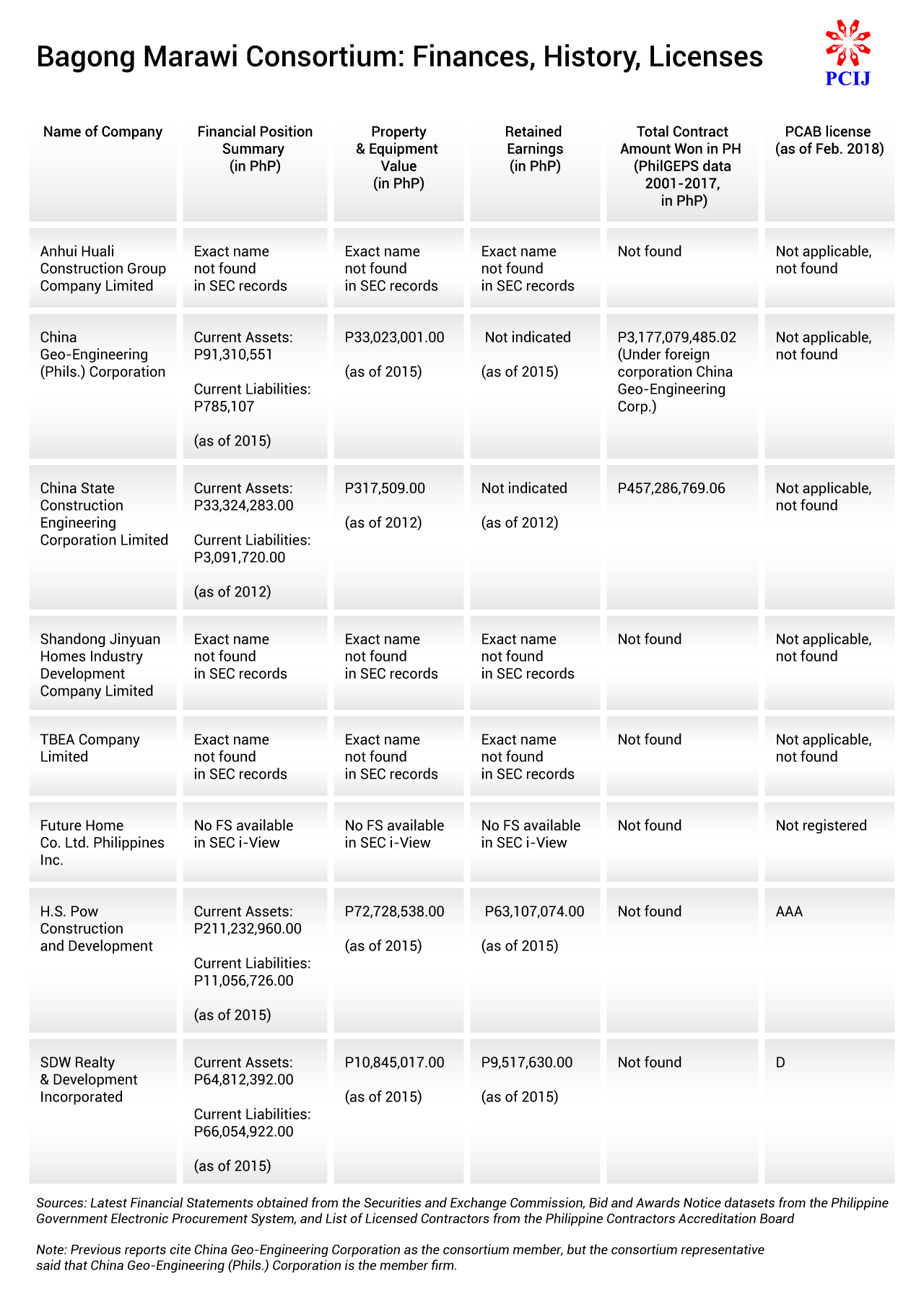
Frail track record
In a phone interview with PCIJ last April 26, Gonzalez said that the BMC is aware of the track record of its member-firms.
While it is true that most of the companies have not been involved in a government project before, he said, the firms have particular strengths that were considered when they were selected as part of the consortium.
For instance, Gonzalez said, SDW Realty and Development has “experience in design and managing projects internationally,” but he failed to specify where these projects are.
Gonzalez noted that the guidelines issued for joint-venture agreements to expedite the implementation of the Marawi projects are not strict about how firms can be part of the consortiums that want to participate in the project.
“There was no limitation in the guidelines as to the selection, and in fact they (the government) would be the one doing the scrutiny to determine if a member is qualified or not,” Gonzalez said. “Since we've reached that stage that they accepted our offer, government will determine the qualifications of the members.”
In the meantime, Future Home's Tamayo told PCIJ that all the consortium members have been advised “not to divulge any information to any third party to avoid leakages” as they are still in negotiations with the government.
Ready or not?
For sure, although TFBM chief del Rosario talks like BMC is already it, the consortium will receive its “original proponent status” certificate and get first right to the project only if it passes approval by a seven-person selection committee that is composed mostly of Duterte appointees and allies from Davao City and Mindanao.
BMC's unsolicited proposal will thereafter be subjected to a month-long period to allow other entities to submit counterproposals, a scenario that is often referred to as a "Swiss Challenge." If no challengers come forward, or come up with a better proposal, BMC is sure to bag the deal.
“The Swiss challenge will be a very challenging part of our journey in getting the project award,” Tamayo said. “Thus prudence dictates all members to be careful in dealings with third parties particularly in sharing information about the project.”
Yet even all the seeming flaws of BMC could be trumped by those of Duterte's own EO No. 49, which offers a bypass course from government's rigorous procurement rules and guidelines.
Most importantly, the EO has exempted the NHA from NEDA's Guidelines on Joint Venture Agreements, in order "to expedite the implementation of recovery, reconstruction and rehabilitation projects in the most affected areas in Marawi City."
This means that whatever JVA with BMC or another entity NHA wants to sign on to, it could do so at will, according to Duterte's EO.
That shortcut route, procurement experts tell PCIJ, will also mean that NHA would be in clear violation of the procurement law, NEDA's guidelines, and Executive Order No. 423 issued by President Benigno S. Aquino III in 2013 that required NEDA review of all public contracts for goods and services worth P1 billion or more.
But for now, Task Force Bangon Marawi and its selection committee must accomplish one urgent task: Compel Bagong Marawi Consortium to submit all its documents, from consortium agreement to financial and technical proposals, and detailed costing of the project’s scope of work.
This Friday, May 25, is BMC's ultimate deadline, according to HUDCC's Millar. If it fails to meet this, "kung bagsak, there will be failed negotiations, we are back to square one."
Such as a sad ending to the touch-go selection process would be sure to displease the President.
Del Rosario had announced last week that on or about June 16, at the close of the Holy Month of Ramadan, the Task Force would have "groundbreaking" rites for the MAA projects.
Duterte, he said, would be the event’s special guest. — with reporting by Carolyn O. Arguillas, MindaNews; additional research by Karol Cruz and Kreizel Bojero, PCIJ, May 2018
- Latest
- Trending

























